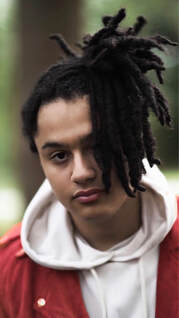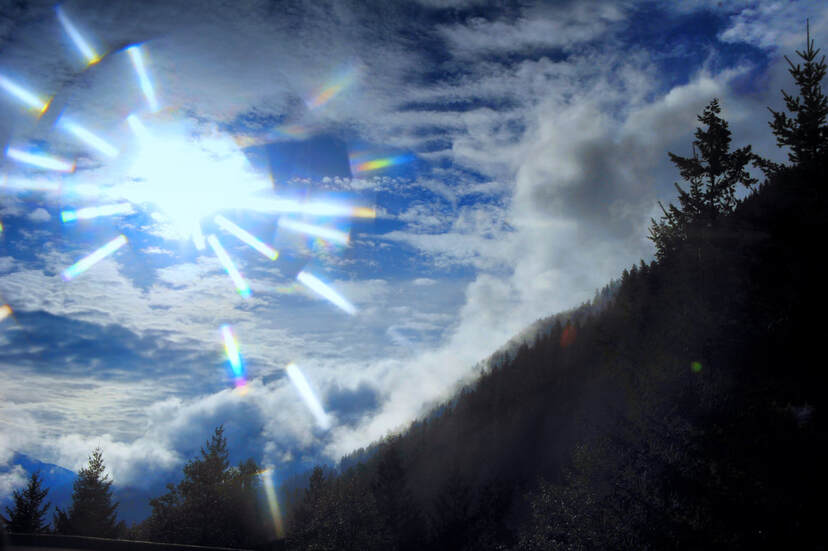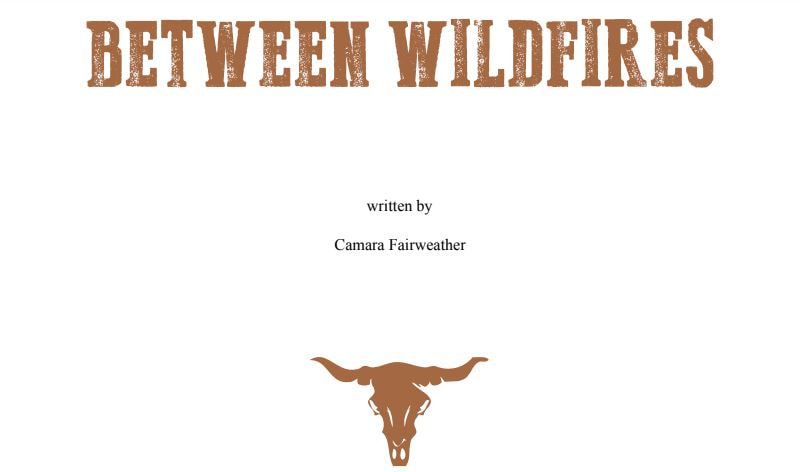|
5/27/2020 Between Wildfires by Camara FairweatherSiletzs Territory, Oregon, 1845 Adelaide stepped down from her horse and looked out across the open plains but couldn’t see anything more than dark outlines in the evening dusk. As she stood there, listening to the cicadas in the distance, a dry wind twisted dead leaves around her. The wildfire had died some days back. There were still embers trailing through the air, racing red and hot among the white ash. ‘Steady now,’ she said in a low voice, running a hand over her mustang’s rosewood mane, feeling the soft touch of the brushed hairs passing between her fingers, ‘I’ll be back before long. Be good for me until then, okay?’ She pushed her wide-brimmed hat back onto her head, gathered the reins, and with one last look to the horizon, set about tying her horse to the black remains of a tree. She wasn’t exactly a Christian woman, nor was she the God-fearing type, but as the embers flamed and sawed beneath the evening sky, she couldn’t help feeling as though she were staring at a scene from Revelations. She lifted her father’s double-barrelled shotgun from the leather saddlebag and turned it over in the half-light. She liked the way the gunstock rested in her arms. The weight of the wood. The cold touch of metal against her skin. Made her feel alive to the narrow truths of the world. About the only thing that did anymore. With a shallow breath, she broke the double barrel, chambered the 10-gauge rounds, and started down the trail. She moved slowly, staying close to the ground. A solitary figure against the dark and empty landscape. As she walked, she saw the carcasses of animals lying face down in the pale ash, smoke rising from their blood-black fur. The dry river bed had once been home to freshwater fish. As a young girl, she had seen them swimming in the clear current and watched as their small fins weaved between the white edges of the water. The wind-kissed banks were wet with honeysuckles and moss, sparkling in the low sun. It was there, among the deep green shade of the pines, that her father taught her to fire a shotgun. She remembered waiting, perched in the thickets, her father breathing over her shoulder, as she tracked a white-tailed deer between her cross hairs. She had moved instinctually – pulling the trigger in the space between heart beats – that short moment between breaths. The deer faltered and fell. She skinned the animal later that morning, starting at the back legs, cutting along the tendons with the sharp edge of a knife. The muscles had a lot of gristle. It had taken her some time to saw through. When she finished, her father had been so proud. Said she was a natural. He was dead now. Buried in an unmarked grave. Somewhere on the outskirts of Louisiana. She thought about her parents as she moved deeper into the ashen valley, following the set of tracks drawn across the trail. Her father had been a slave. Her mother a southern belle. They had met on the bayou and spent the short time they had together out on a wide gallery porch under deep overhangs. Her memories of them were sun-bleached and faded. She found it hard to recall their faces. They drifted away from her reach, lost in the wind, like a dusty and half-remembered photograph. After a while, the dead grass gave way to a small clearing out on the plains. A man growing into his later years was resting against the hard edge of a rock, warming his tired hands by a dying fire. Above him, hanging from the thin branch of a tree, was a lynched Native American man. His buckskin shirt ripped. His face paint scratched away. And the words ‘red-skin’ had been written across his body in blood. ‘Hey there, old-timer.’ ‘That’s far enough.’ The man said in a whiskey-soaked velvet, hammering his .44 caliber revolver. He had a hard face. Smelt of cigar smoke and rough-hewn wood. ‘Now, I’ve never really liked repeating myself so I’m just gonna say this one time. You come any closer and the next round I fire will be the last thing you see.’ ‘I know it’s been a while but I figured you’d recognise me.’ ‘And why’s that?’ ‘I’m a ghost from your past.’ She said, stepping forward into the firelight with her shotgun holstered, the sound of her spurs carrying on the wind. ‘Now, ain’t that something. You’re the little half-caste girl from Red River.’ ‘Yeah, well, not so little anymore.’ ‘You’re a long way from home.’ He took a drink from the barrel-aged whiskey in his left hand. Spilled some down his thick beard. ‘What you doing all the way out here?’ ‘Thought the shotgun trained on you might speak for itself.’ ‘That a threat?’ ‘More of a promise.’ She watched the old-timer’s hand tighten around his gun. ‘I’m thinking you probably don’t remember that night or the way the wind howled across the empty fields. But I remember, young as I was. Pillowed there between my mama’s arms. The cold turning my breath to steam. Sometimes I think about the stillness of those moments. The wild rabbits hanging on line, swaying softly above. So intimate and fleeting. Like the faintest whisper. Then I heard the sound of horses in the distance. Horses being ridden hard. The sound of their hooves cutting through the snow. The sound of riders dismounting. The sound of spurs outside the door. The voices of white men closing in. Heart pounding. Door not opening. Voices getting louder. Cursing outside. Mama telling me to be quiet. To hide under the bed. Daddy getting his shotgun. Kicking against the door. Wood splitting. Door breaking. Daddy being dragged out like a junk-yard dog. Mama screaming. The sound of a gun firing. Daddy’s body hitting the ground. Birds scattering. Mama crying. Tears falling. Hands trying to stop the blood. Another gunshot. Then no sound. No sound but the wind.’ She drifted away into silence, taking a quiet moment to breath. The fire between them had burned to coals. It’s warm light died before she spoke again, ‘I still remember the last thing you said before turning tail. Said there are two kinds of people in the South. The quick. And the dead.’ Her eyes narrowed. ‘You want to know which I am?’ The old-timer moved to fire his gun. He was a fast draw – but Adelaide moved faster – firing the revolver out of his hand. ‘That’s right.’ She said, staring down the smoking barrel. ‘Now, raise your hands. Nice and slow, okay, old-timer? No sudden movements.’ He raised his hands some reluctance. ‘All this for a cotton-picking nigger and a white bitch that couldn’t keep her legs shut.’ Adelaide back-ended him with the shotgun, bringing the blunt wood down across his face. Heard bone break as he staggered back – wounded – and kicking up dust. He smiled through bloody teeth. ‘Seems you got me at a disadvantage.’ ‘Don’t smile at me because I’ll rent the smile from your face.’ ‘I’ve never really given the words of women much credence, but I figure I’ll push my chips forward. I’ve been at this a long time. I know a killer when I see one. And you ain’t got the sand.’ She pressed the shotgun barrel to his neck. ‘Then you must not win a lot of poker games.’ She said, exhaling sharply, and there was a cruelty waiting behind the dark and ghostly reaches of her eyes. ‘Do you even regret any of the killings your gang of outlaws laid claim to?’ ‘No. I surely don’t.’ He said, spitting blood. ‘That’s funny. Because I don’t regret killing any of your outlaws.’ She watched his face turn cold. ‘You’re lying.’ ‘Shot and killed every last one of them back in Albany.’ ‘That’s a damn lie!’ ‘I think you already know it’s not.’ She said, pulling a six-shooter from her belt and letting it fall to the ground. He looked down at the blood-rusted metal. ‘That’s my boy’s gun.’ ‘Was.’ She corrected him. ‘That was your boy’s gun.’ He held the revolver in his shaking hands. ‘You’re a rattlesnake on the trigger, I’ll give you that,’ he muttered darkly, ‘but you’ve forgotten that the land beneath you is corpse white. And that ain’t fixing to change. Even if you bury me and salt the grave, there’s nowhere for you to run. This country is full of pitchfork and torches and as long as there are trees in the South, they’ll be lynching black bodies from the branches. They can talk about giving you niggers rights. It don’t matter. Those southern trees have deep roots. Roots that spread in the dark. Been there growing since way before you were born. And they’ll keep growing after you die.’ He looked then to have the Devil in his bearing. ‘You can try to run, rattlesnake, but you’ll be impaled on those roots. And the birds will pick you clean.’ She watched, through the pale and driftless smoke, as he aimed the revolver at her. His finger itched on the trigger but she knew that he would never fire. There was only so much fight in a man and he’d lost his. ‘You think I don’t see you for who you really are?’ She asked with a hollow inflection. ‘All these years, I used to think you were terrifying. I’d wake up in cold-sweats, thinking about the violence you laid at our door, but I was wrong. Because you’re not terrifying. In the end, you’re just so small. I don’t really give a damn if you think I’ve got sand. Your life ends now. You can say whatever you want. This cowgirl has heard it all before. All you can do is pray for a quick death, which you and I both know you ain’t gonna get.’ He opened his mouth to say something cold and callous, but she cut him down before he had the chance. She stood over him as he clawed at his throat, reloaded, and shot two more round into his flesh. He died then and there. Looking down at the ground, Adelaide saw her reflection for the first time that night and recognised that something had changed within her nature. As she walked over the blood, back to her horse, she watched the reflection of the darkening sky ripple beneath her. She didn’t know it then but there would be another wildfire in a few years. Summer after summer the sky would refuse to rain. The wildfire would cut through the plains, burning crops and trees and wiping away whole towns as though they were nothing more than tinder. Some people would burn alive. Others would suffocate from the inhalation of smoke. And many would run, leaving the lives they once knew behind forever. The wildfire would burn away all the cowboys hanging onto their fading way of life, as if they had never really existed, but Adelaide would remember.  Camara Fairweather (b. 1998) is a biracial writer, illustrator, and poet from the United Kingdom. He has worked for BBC Three and flagship programs such as Newsnight. He is currently studying at the University of East Anglia. Comments are closed.
|
AuthorWrite something about yourself. No need to be fancy, just an overview. Archives
April 2024
Categories |


 RSS Feed
RSS Feed
